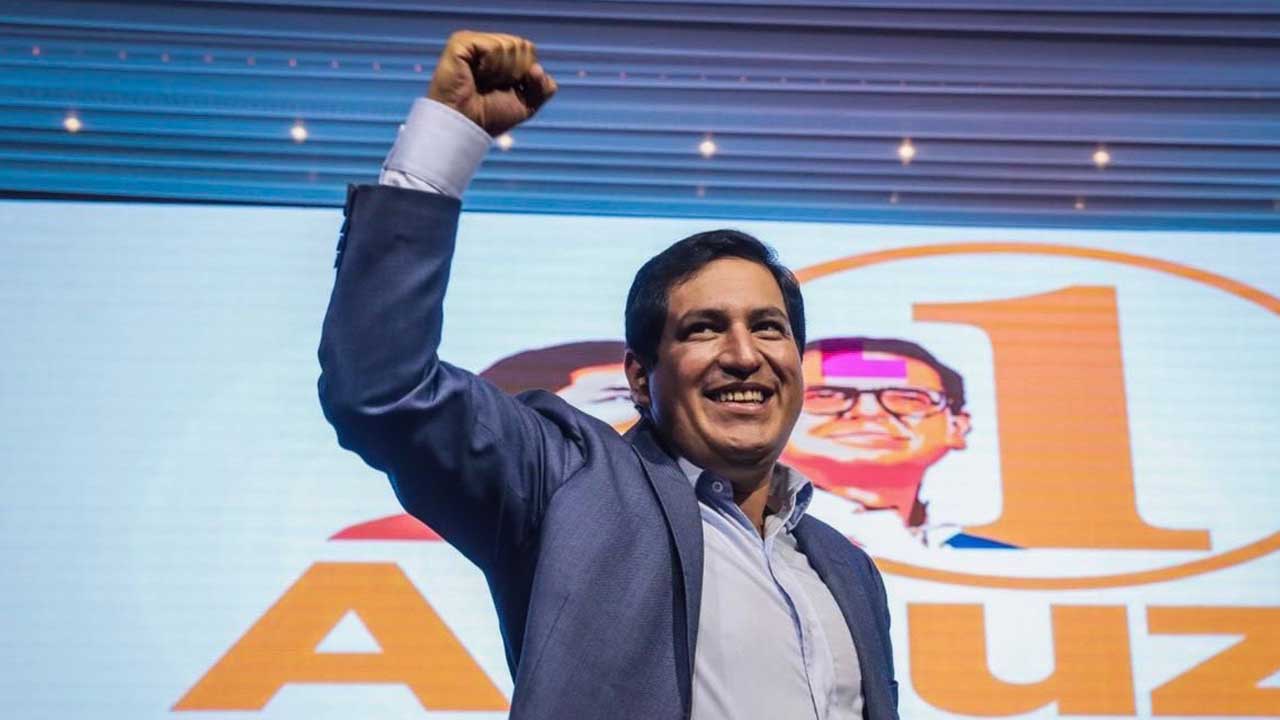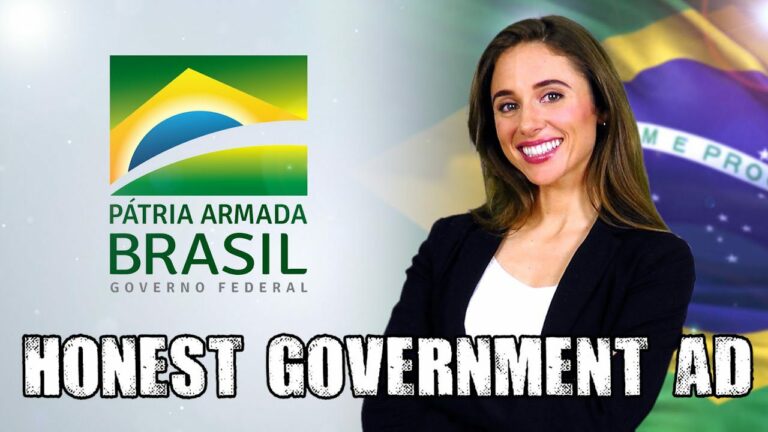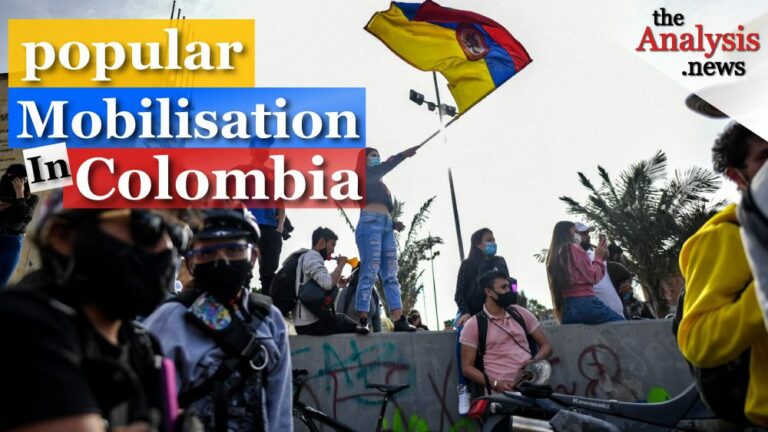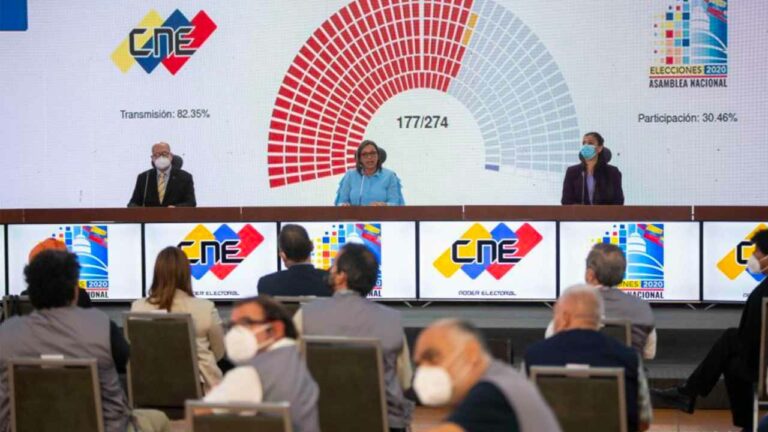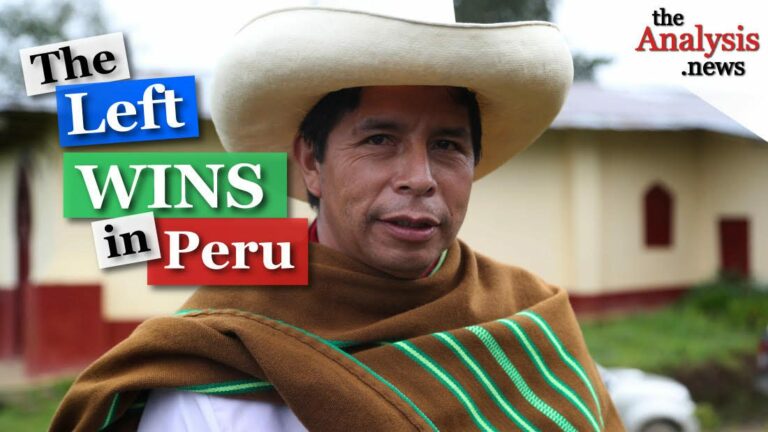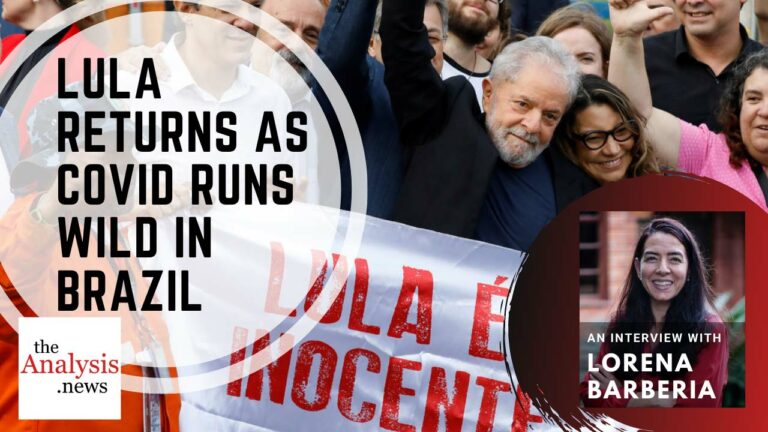US Media’s Sins of Omission in Ecuadorian Election Coverage
By omitting crucial information about the recent presidential election in Ecuador, such as how the leftist front-runner Andrés Arauz has had to overcome countless obstacles in order to participate, the US media once again contribute to the effort to undermine a free and fair election, says media analyst and Ecuador specialist Joe Emersberger.
Transcript
Greg Wilpert
Welcome to theAnalysis.news, I’m your guest host, Greg Wilpert.
On Sunday, February 7th, Equador held a presidential election in which leftist candidate Andrés Arauz led the election result with 33 percent of the vote, Arauz is the standard-bearer of the Citizens’ Revolution movement that former leftist President Rafael Correa launched in 2007. Arauz’s nearest challenger was the conservative banker and one of Ecuador’s wealthiest individuals, Guillermo Lasso, who won about 20 percent of the vote, and surprisingly, the third candidate was Yaku Pérez of the Pachakutik indigenous party, which also nearly got 20 percent of the vote.
Now it looks like there will be a runoff election between Arauz and Lasso on April 11th. I say that it looks that way because there have been several concerted efforts, including from international actors, to derail the runoff election in order to prevent Arauz from winning the presidency in April. Joining me now to discuss the situation in Ecuador is Joe Emersberger. Joe writes regularly on Latin America, particularly on Ecuador and Venezuela, for a wide variety of outlets such as Counterpuncher, FAIR, and ZNet, among others.
Thanks for joining me today, Joe.
Joe Emersberger
Thanks, I appreciate you having me.
Greg Wilpert
So I should add that we both have a bit of a history with regard to Ecuador. I lived there for nearly five years from 2014 to 2018 while I was working first for Telesur English and then for The Real News Network, and you have a family background in Ecuador, even though you’re Canadian, both your wife and your mom are Ecuadorian, right?
Joe Emersberger
Yes. I’ve been back and forth from Ecuador all my life since I was a little boy.
Greg Wilpert
So I want to start with this article that you recently published for the media watch group FAIR, where you pointed out many of the distortions in the U.S. media with regard to Ecuador. So let’s start with how they – that is the U.S. media – have tended to characterize the presidencies of Rafael Correa and his successor, the current president in Lenín Moreno. That is first. How would you say are the two usually depicted and what is wrong with their depiction?
Joe Emersberger
OK, well, Correa, I should say, was depicted basically as authoritarian, and he especially got rapped for having a poor record on press freedom because he had a very contentious relationship with the press, that’s certainly true, but he was depicted as basically clamping down on press freedom, and that Ecuador was a very dangerous or difficult place to be critical of Correa’s government, which was a total falsehood. Mind you, there are things that you could criticize about Correa’s government along that lines, which is the fact the libels part of the criminal code, things like that.
Like any country, there are definitely things you could criticize, but I would say just the press that Correa got was very bad. Private media was constantly against him and he answered back through the public media, and there was basically an ongoing battle going on. What happened when Moreno won the presidency in 2017, deceiving voters that he was going to be the continuation of the Citizen’s Revolution of Correa, maybe with a somewhat different style or whatever, but basically a continuation, that was a totally fraudulent campaign because when he took over within weeks, really, it was very clear that Guillermo Lasso the right-wing banker who ran in 2017 might as well have won. He [Moreno] implemented his [Lasso] whole program.
Moreno became the worst enemy of Correa and everything he represented. It was just a total transformation, and as soon as he did that, what Moreno did was he basically made public media start echoing the same line as the private media. The same basic line that the private media always had. So immediately overnight, you had a media monoculture that demonized Correa and this facilitated the arrest of many of his key people. Jorge Glas, the elected vice-president, was imprisoned throughout Moreno’s time in office. The governor of Pichincha province, Paola Pabón, she was thrown in jail.
The assemblywoman Gabriela Rivandeneira (ex-President of the National Assembly) would have been in jail, but she, like other National Assembly people, they fled into exile. Ricardo Patino (ex-foreign minister). All these top people who are with Correa, they’re suddenly treated like criminals throughout the whole big media establishment in Ecuador. In the Western media, it was the other way around Moreno immediately, as soon as it was clear that he was going to become this right-wing president that he never presented himself as in 2017 on the campaign trail, as soon as that became clear, all this repression and all this hypocrisy, it was just depicted as him being more tolerant.
And as far as the media was concerned oh this is wonderful, and you got a lot of nice write-up right away from The Washington Post editors wrote an editorial about him, praising him as a big Democrat. Human Rights Watch was extremely flattering towards him for years now. Now they’ve kind of been quite quiet about it.
They haven’t really said much of anything, but that’s what it was. It was a big transformation. It was a day and night transformation. With the election, for example, a key point that you never see anywhere, and I wrote about this in the article, is that when there was this obvious break, all of a sudden when Moreno turned completely against Correa and everything that he represented, what he did, he seized control of Alianza PAIS, the party that Correa had founded, because he was able to do that, and so, therefore, Correa and his people, they said well OK, now we want to register another party. We want to participate in another party. We don’t have this one it was taken away, OK, we want to participate with another party. Have never been allowed to do that in the past four years, and it’s really striking because that’s the kind of thing that’s going on in Venezuela sometimes, where the rulings go against their opponents in terms of whether they have to register or reregister for elections or whatnot.
I remind you, but that’s in a completely different context, where you actually have an opposition movement funded by the world’s most powerful state trying to overthrow the government. Moreno doesn’t face anything like that. He’s just, with the support of the propaganda organs of the Western states, he’s going after his political opponents. So we have this political force that just won 33 percent of the vote in these elections, and they don’t really have their own party.
I mean, they ran under the banner, the Centro Democrático, but that’s not their party. They had to make alliances just to be able to run. In fact, in 2019, when they ran in local elections, they were with another party the Fuerza Compromiso Social. That was list number five. So they had a switch because prior to these elections that party was then banned by the authorities from being allowed to run.
So there are all these barriers in addition to the persecution of Correa and his followers, there are all these barriers that the electoral authorities have thrown up in his way, and if you read like I pointed out, outlets like Reuters or New York Times, all of that when it isn’t ignored completely or it’s actually spun as evidence of Moreno’s sincerity, of his battle against corruption. It’s very striking.
Greg Wilpert
Yeah, especially if you make the comparison, like you said to Venezuela, it’s just amazing where one of the leaders of the opposition Leopoldo López was prevented from running for president, and that’s being used now as the reason for not recognizing Maduro’s election in May of 2018, whereas this is completely being ignored now, this near, disqualification of Andrés Arauz, and if they could have found some way of doing it, they would have, but in Leopoldo López’s case, he was clearly involved in an insurrection against the government. You can’t say anything like that about Arauz.
But let’s turn to Arauz now. We have actually both interviewed him on several occasions, you for Counterpunch and I for The Real News Network well before he decided to run for the presidency. Now, how would you say he is being characterized in the U.S. media, and what’s wrong with that characterization?
Joe Emersberger
Well, to the extent he’s being covered at all, he’s being covered as if he were some kind of puppet of Correa. There have been articles, there’s one in The Economist talking about this problem of proxy presidents. If you read between the lines, what they’re worried about is the fact that term limits. The Western powers have made a big deal about term limits because they don’t like popular leaders like Chávez, like, Correas, or Cristina Kirchner in Argentina.
They don’t like the idea of them to keep winning elections. Well, just like FDR in the United States. So they want him under the guise of strengthening democracy, whenever they want to push term limits. Supposedly that makes their democracy healthier. I mean, I think the arguments against that are terrible. Arguments in favor of that are terrible. To the extent that they talk about Arauz they don’t say much, they basically just depict him as if he were just a puppet of Correas, but you can already see that he’s trying to do a few things differently. I should say, if you follow Ecuador’s media, especially their social media, it’s really wild, because they’re really going all out trying to convince people that he’s stupid. I mean, he’s a guy who speaks four languages, who ran the central bank at the age of twenty-four, and there are people, like I have relatives that actually tell me, oh, no, he’s a really dumb guy.
I told one of my relatives, I said, look, if they can convince you that Arauz is a dumb guy, they’ll probably convince you that he’s three meters tall and blond. I mean, they’ll convince you of anything because it seems like you’ll accept anything they say. So he’s a brilliant young guy, and you can actually already see he’s trying to do some things differently. It looks like, for instance, he’s trying to reach out to the CONAIE leadership who are terrible. Not all of them, but for the most part, pretty reactionary during Correa’s time in office, for most of his time in office. But he’s trying to build bridges.
Specify first how CONAIE is different from Pachakutik.
Yeah CONAIE is a confederation of indigenous movements. It’s kind of a loose confederation in a way. So it’s not monolithic, but many of the top leaders have been very reactionary over time. They came out, for example, when Correa tried to increase taxes on land speculators and large inheritances that would have only impacted the richest three percent. He brought this in 2015. They were against that. They were kind of echoing the talking points of the right-wing media on that.
Also during Moreno’s initial years when he did this incredible right turn a lot of CONAIE leadership was right in there with him supporting that, and in fact, one of their former vice presidents had to resign from Moreno’s government when introduced extremely unpopular austerity measures in 2019, but he had to delete a tweet where he was first coming out to support them, and then he immediately realized, oh, my God, no, this is not the thing to do.
So he deleted it and then joined the other indigenous leaders and very strongly coming out against that. So in spite of that, I think I see Arauz, because Correa had a very poisoned relationship with the indigenous leadership, and because of that, I think that affected his ability to reach out to the base. And that’s a whole different thing, there’s a big difference between the base of a party or even a union movement or anything and the actual rank and file members.
Sometimes it could be quite a drastic difference, but the problem is, if your relationship is poisoned with the leadership, you can say, well, how do you reach out to the base then? So I can see Arauz making moves and trying to be more diplomatic with the CONAIE leadership. CONAIE is not the only indigenous confederation, but they’re the largest. So I see that as a difference in Arauz, and you can see that even – Arauz was very involved in the center of economic policy research and doing the work to expose the fraudulent electoral monitoring of the OAS in 2019 in Bolivia.
So when Evo Morales was able to return to Bolivia after the democracy was restored in 2020, he invited Arauz to attend events where he spoke in front of Morales supporters, large crowd of supporters, celebrating Evo’s return, and he was also there with several CONAIE leaders. I just know from talking to him in the past that he believed that through Evo, maybe they could at least get some kind of a working relationship.
I see him making moves, and that’s a distinction from Correa. He’s also made kind of a big, and I want to ask him, he replied to me recently saying he’d try to get back to me through an interview, a brief interview, but I really want to explore his ideas about how to democratize the media terrain in Ecuador, because I think what Correa did was he basically just said, OK, I’m going to use my platform to balance that basically.
He did other things as well. He tried a regulatory approach, but that could be critiqued, and sometimes violently on free expression grounds, even if they were overblown and everything else, but there is that. It’s not like there was no basis for critiquing that either. So it sounds like Arauz wants to do things differently, but I would like to get more clarity on what exactly he plans to do differently because as long as he’s trying to reform media, I think that’s a positive thing, but what you don’t want to see is any kind of backsliding or going easy on the private media because they’re very vicious. They’re totally against any kind of social reform, so it’s an important issue.
Greg Wilpert
Hmm, I want to turn in a moment actually to more of Arauz’s program, but before we go there, as I mentioned in the introduction, there have been concerted efforts actually to derail Arauz’s run for the runoff election. I mean, they are very obviously for the first round, but now also for the runoff vote. Talk about what those efforts have been and who’s behind them.
Joe Emersberger
Yeah, well, right after he won and this is shocking. I mean, again, I follow Reuters very closely because I think they are a key, you know if you’re a media analyst in the West, they’re a key outlet to follow up, because their reports get reprinted so much all over the place in some form in so many different outlets. The New York Times, Washington Post, all these big-agenda setting media, even the Guardian, they’ll often just cut and paste writers, or tweak them a little bit.
So they’re really important to follow, and what you see from them when all this happened, that Ecuador’s prosecutor basically made a big show of meeting with her counterpart in Colombia, because this outlet in Colombia had come up with this report saying that Arrauz had received eighty thousand dollars from the ELN rebels in Colombia, So the prosecutors then get involved in making this big show of exchanging information, and saying that they’re looking into this.
So it’s all basically an attempt to, first of all, to them to put a cloud over Arauz to make him look shady and criminal and basically give credence to this report, which is it’s been refuted on a bunch of different grounds. It’s preposterous on its face, but it’s also, for example, there was an expert in wildlife and birds who noticed that the one video that was supposedly where the ELN person [expressing support for Arauz] where he referred to comrade Arauz, it turns out that the birds, that this video was supposedly in Colombia, but the bird that the expert heard chirping away there could only be found in southern Ecuador (https://www.theguardian.com/world/2021/feb/09/ecuador-bird-fake-video-colombian-guerrillas).
So it was obvious that the video was staged, wasn’t what it was supposed to be. Another thing is they claimed this money was received when he was at the conference for Progressive International, but that conference was over the Internet. It was virtual like we’re talking now. It’s not like a meet-up at a conference where we can actually meet-up and do things. It was all virtual. The story was just full of holes. It was obviously just a big hit piece. Even the reporters who said the story tried to hedge their bets, they tried to say, well, we know of course, we can’t confirm that this is certain in other words, what they were doing is just recycling allegations, spreading them around and just flinging mud and hoping that it would stick, and then the prosecutor’s got involved with the same thing.
That’s very menacing because there was chatter on social media among the Ecuadorian right-wing that, aha he’s not even going to be in the second round, he’s going to be disqualified. Of course, that’s threatening given what Moreno has gotten away with, but also just this whole fact that you have the prosecutors including Colombia’s prosecutor, getting involved in basically trying to smear a candidate in the middle of an election.
Again, this is the kind of thing, if Maduro’s government was doing anything like this, I mean, this is headline news. Decisions that if you follow Reuters if the CNE in Venezuela just makes an announcement that maybe they’ll make a party reregister. Boom headline, but all of this stuff that I’m talking about, you look at Reuters, it’s not there. It’s just blanked out.
They basically aren’t saying anything, and that to me is very threatening because the less international outlets report the facts, the more the Morales government can get away with. I was personally actually very relieved when about a week before the election, Reuters ran a pretty nondescript article, it had a lot of problems, but they did at least concede that Arauz was in the lead in most polls. I was actually relieved by that because I said, well, it’s less likely that I think that they’ll try to pull something really outrageous with the vote count because Moreno’s government is very sensitive. He’s been propped up to a large extent by good press around the world.
Greg Wilpert
Hmm. Another main element, though, seems to be also this effort to do a recount of the first round. Now, I understand that has been abandoned, but what was that all about and how would that have affected the runoff on?
Joe Emersberger
Yeah, well, Lasso, when the votes finally got tallied up, Lasso ended up with point three five of a point, something very, very close above Yaku Pérez. If you looked at most of the polls, Yaku Pérez was only going to get like 13, 14, 15 percent.
Somewhere around there. He ended up getting 19 and more. In some polls, he had below 10 percent. Only one poll that I found that actually had him around 19 percent or so, and even that poll had him like four points behind Lasso. So really there was nobody who was predicting that he would possibly come in second. So he came within a sliver there within a fraction of a percentage point of coming in second, which would have put him in the second round against Lasso.
So he [Pérez] immediately cried fraud, and Reuters reported the fact that he made fraud allegations and that he didn’t have evidence, but what Reuters didn’t tell people is that he actually accused Correa of manipulating the [inaudible] in Belgium, who can’t even come back to his own country because he’d be arrested. Yaku Pérez accused Correa of manipulating the vote count so that he would come in third. Correa mocked that on Twitter saying, well, why didn’t I manipulate the vote count somewhere else, so Arauz would just win in the first round, but it’s preposterous because, over the past four years, the electoral authorities have done nothing but put obstacles in the way, and come just short.
It was only by a vote of three to two that Arauz was even allowed finally to run his candidacy in late October if I don’t have the date wrong. It was very late that he was finally allowed to run at all. It’s pretty scandalous by itself considering he’s the guy who just won the first round of the election. He almost didn’t qualify for the vote, but they’ve done so much to suppress the Correas the last four years, and yet this guy comes out and publicly says that Correa is interfering in the vote count and conspiring with Lasso, and meanwhile, Yaku Pérez actually endorsed Lasso in 2017 and then days before the election because there were some polls kind of putting in doubt whether a lawsuit could come in, whether Lasso would come, how Lasso would do so Lasso said something like, well if Yaku Pérez does come in second, I will totally support him in the runoff against Arauz.
So he returned the favor. I mean, Yuku Pérez is quite a case of very reactionary character. We can probably talk more about that, but the bottom line is he made ridiculous statements, and writers just kind of kind of squashed it. Kind of covered it up, but he also said that he wouldn’t be surprised if there was a recount that Arauz would end up in third place. Again, that’s just absolutely ridiculous. I mean, Arauz won the first round by 13 points.
Yet here he is saying that, no, actually, we do a recount Arauz is going to come down to third. Just crazy stuff, but this was not, unless you followed events through other, basically in Ecuadorian media, maybe sociably, you would know any of this. I mean, just what you get from the international media just doesn’t tell you.
Greg Wilpert
And also, it seems that Pérez received some support from the Organization of American States. What was that all about? I mean, like you mentioned, they were instrumental in the Bolivian recount situation and the whole debacle there, but what was their involvement here in Ecuador?
Well, the fact that they’re involved anywhere is just scandalous. I mean, after their fraudulent audit in 2019 in Bolivia, in October of 2019, and throughout those crucial months, I mean, that was absolutely crucial to inciting the coup, and they were lying from day one saying that there had been this drastic, inexplicable change in trend in favor of Morales as the votes came in, and that’s just absolutely a lie. There were perfectly obvious reasons why have the votes come in, sometimes the trend can go a certain way depending on where the votes come in.
For example, in Ecuador just now, Lasso was behind Pérez. Right, and as the votes came it was days before Lasso went into second place and surpassed Pérez. Actually, Correa pointed this out on Twitter, and that was the basis for Pérez saying that aha see Correa was meddling in the vote because all Correa did was he just looked at where the votes remain to be tallied.
And he said, look, they’re almost all coming in from the coast, and those voters overwhelmingly favor Lasso over Pérez. So Correa said by my estimate, Lasso will squeak ahead of Pérez when all the votes are counted. That’s exactly what happened because it was predictable based on where the votes are coming from.
Very similarly in Bolivia, Evo Morales’s lead increased as the votes came in from the areas that tended to be counted last. Rural areas where his support was strongest.
So there was nothing unusual about this, it was obvious and yet the OAS lied. They have technical people. They know how elections, votes, happen. They’re not novices. This was very evil. This was lying, and the Center for Economic and Policy Research was all over them from day one about the fact that they were doing this, and outlets like Reuters covered it up, but I think thanks to the mobilizations in Bolivia, that the unity of the movement, they just couldn’t be sustained.
Again, when you saw the election in 2020 in October 2020 when [Luis] Arce won, we saw exactly the same trend that they said was so drastic and inexplicable and everything else, exactly the same kind of trend for Arce. OK, so I mean, this was just horrible, and again, it’s scandalous to me that they’re involved in an election anywhere. So the fact that they’re involved in Ecuador’s election at all is very worrying to me, but it looks like.
So what they did was when Lasso crept ahead of Pérez, Pérez cried foul, that he’d been robbed. I was in second and now I’m not. I’ve been robbed. Correa robbed me of my votes. So they had this big open. It was open to the media where basically the second and third-place finisher sat there. They had it was an open negotiation session, but it was also like an anti-Correa rally at the same time.
It was very, very weird, and they basically hashed out, did a lot of grandstanding, and hashed out an agreement which lasted between them, which the OAS sat there and and the electoral authorities sat there and they all kind of came out of there. Supposedly there had been some kind of agreement to do a recount, but then immediately, Lasso had second thoughts, put out a statement saying, basically, I don’t think this is legal.
And then Pérez cried foul, saying he’s organizing a march. And Pérez said Correa is going to bring, macho because Correa is going to stick his Venezuelans in here to stir up violence, he actually said that. Just extremely xenophobic and stupid and he’s just a lousy character. So that’s where we are. It’s a joke. Now, the CNE (National Electoral Council), I don’t know, maybe they decided that the circus doesn’t actually serve their interests.
So they kind of just pulled the plug on the circus and said, OK you know what? We’re going to announce the results in a few days, and I think maybe they might have got some talking to from Washington and maybe the OAS, because a week before the election, Moreno goes to Washington and meets with Almagro and Biden’s people in Washington, and that’s, again, very alarming, and so maybe they decided to end the circus and at least for now.
So now they’re going to just within a day or two they’ll announce the official results, which it looks like it’ll probably be Lasso going to the runoff.
Greg Wilpert
Right, now I want to turn to Arauz’s candidacy, what he stands for. Who Is he and what are, as far as you can tell, what does he hope to achieve if he were to win the April 11 runoff election?
Joe Emersberger
I think from everything he says having talked to him for years before he was even on the radar. When I interviewed him he was very easy to get a hold of. Although he was a pretty high-ranking official, he had been head of the central bank. He had been minister of human talent and knowledge. He basically had been part of the economic team of Correas, and a key part of it, since he was very young. He had just turned thirty-six the day before the election.
For ten years he’s been part of Correas’ economic team. So he’s an extremely accomplished young man. He speaks four different languages. He speaks Russian, French, English. He speaks English very well. Actually, the first two times I interviewed him I interviewed him in Spanish. I didn’t even realize he spoke English so well. It would have been easier for me, but just that I transcribed it all, but the third one, I realized oh, my God he speaks great English.
I’ll get to do the interview in English. So I did that, but I think for what he says, he basically wants to do Correa’s program, but I think he thinks he can do it better. He wants to correct things that were wrong. I already mentioned it seems like he wants to have a better, at least a not hostile relationship with CONAIE leadership.
He seems like he’s made somewhat vague comments about having a different relationship or a different approach to mass media, although he’s talked a lot about, he wants to guarantee people access to Internet, basic access to Internet, and if you think about it, that’s all also good, also that could potentially help people also broaden their access, especially the most marginalized people, to just potentially wider points of view as well.
I would like to ask, I would like to investigate that, because I think that’s crucial, too, because I don’t think any of the left governments, in my opinion, in Latin America in this 21st century, ever really figured out how to deal with the fact that they have an extremely hostile media. So that would be worth exploring, but in terms of basic the economic approach, I think it’s going to be basically is going to be like Carreas.
He’s going to maintain dollarization. Once you’re in it, getting out of it is not. It’s just honestly just impossible unless you have, something that’s just not going to happen realistically any time soon. So basically, they’re committed to the dollar, as was Correa and as is Arauz, and he is going to maintain the same basic macroeconomic approach. I think it obvious there is going to be some difference in those other areas, though he has made clear it’s going to be a little different.
And you see the same thing with Arce and Evo Morales. You see there’s some differences, right? So there are always going to be some differences, but I think given the fact that Arauz was a Correa supporter when it was difficult to be, I think that’s an encouraging sign because if you think about it, Moreno won his election in 2017. He jumped on Correa’s 10 years in office, but he was never a person who was involved really with the economy.
He was more like an ambassador for the Citizens Revolution, and Arauz, I talked about this in our first interviews. He’s always kind of a very conciliatory figure who didn’t want to confront anybody or make any enemies in large part because he did not get involved with the economic policy, unlike Jorge Glass, who was very deeply involved in the strategic industries they were trying to develop, and that also made him more enemies, because now you’re involved with contracts and involved much more with money, basically.
So that’s what I think is going to be pretty much the same as Correa, but with a different approach on some areas maybe. He seems to be less eager to antagonize, mock his opponents than Correa was. Correa was very much a respond in kind, kind of like Chavez.
Greg Wilpert
Hmm, OK, well, we’re going to leave it there for now, but maybe we’ll come back again after the election and see how things turn out. I was speaking to Joe Emersburger, a Canadian writer and analyst on Latin America. Thanks again, Joe, for having joined me today.
Joe Emersberger
Oh, thank you very much. I appreciate it.
Greg Wilpert
And thank you to our listeners and viewers for tuning in to theAnalysis.news. Please don’t forget to support our work by heading to theAnalysis.news website and making a donation.
Podcast: Play in new window | Download
